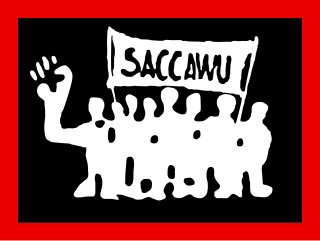Related Research Articles

The World Federation of Trade Unions (WFTU) is an international federation of trade unions established in 1945. Founded in the immediate aftermath of World War Two, the organization built on the pre-war legacy of the International Federation of Trade Unions as a single structure for trade unions world-wide, following the World Trade Union Conference in London, United Kingdom.
Ray Alexander Simons (née Alexandrowich; was a South African communist, anti-apartheid activist, campaigner and trade unionist who helped draft the Women's Charter. She moved to Cape Town in 1929 to escape the persecution of Jews and communists.
The Zimbabwe Congress of Trade Unions is the primary trade union federation in Zimbabwe. The Secretary General of ZCTU is Japhet Moyo and the president is Peter Mutasa. The former General Secretary was Morgan Tsvangirai. Jeffrey Mutandare is a former president of the ZCTU.

The South African Commercial, Catering and Allied Workers Union (SACCAWU) is a trade union representing retail, distribution and hospitality workers in South Africa.

SASBO – The Finance Union is a trade union in South Africa. It was founded in 1916 and has a membership of 70,000.
Trade unions in South Africa has a history dating back to the 1880s. From the beginning unions could be viewed as a reflection of the racial disunity of the country, with the earliest unions being predominantly for white workers. Through the turbulent years of 1948–1991 trade unions played an important part in developing political and economic resistance, and eventually were one of the driving forces in realising the transition to an inclusive democratic government.

The Federation of South African Trade Unions (FOSATU) was a trade union federation in South Africa.
Elizabeth Adriana Abrahams was a South African political activist and trade unionist who participated actively in the struggle against apartheid. Born in the Paarl Valley area of Western Cape Province, South Africa, she became General Secretary of the Food and Canning Workers Union (FCWU) in 1956, a duty she performed until 1964. Her commitment to the struggle brought her close to activists including Elizabeth Mafikeng, Archie Sibeko, Oscar Mpetha and Ray Alexander. She was in 1986 detained for police questioning and subsequently detained for almost three months without trial. After her retirement, Abrahams remained actively involved in the Food and Allied Workers Union (FAWU), and was in 1995, a year after South Africa's first democratic elections, invited to serve as a Member of Parliament. During the last years of her life, Abrahams received several awards for her contributions to the liberation movement and for her activities on behalf of the rights of the working class.
The South African Railways and Harbours Union was formed by black workers of the South African Railways and Harbours Administration after they had been expelled from the National Union of Railway and Harbour Servants.
The Council of Non-European Trade Unions (CNETU) was a national trade union federation bringing together unions representing black African workers in South Africa.
The South African Congress of Trade Unions (SACTU) was a national trade union federation in South Africa.
The South African Allied Workers' Union (SAAWU) was a general union in South Africa.

The Sweet, Food and Allied Workers' Union (SFAWU) was a trade union representing food processing workers in South Africa.
The General and Allied Workers' Union (GAWU) was a general union in South Africa.
The Black Allied Workers' Union (BAWU) was a national trade union federation in South Africa.
The Hotel and Restaurant Workers' Union (HARWU) was a trade union representing hospitality workers in South Africa.
The South African Trades and Labour Council (SAT&LC) was a national trade union federation in South Africa.
The Furniture Workers' Industrial Union (FWIU) was a trade union representing workers involved in making furniture in South Africa.
The Textile Workers' Industrial Union (TWIU) was a trade union representing workers in the textile industry in South Africa.
The Sweet Workers' Union (SWU) was a small but long-lived union representing confectionery workers in South Africa.
References
- 1 2 3 4 5 Bendix, Sonia (1996). Industrial Relations in the New South Africa. Cape Town: Creda Press. ISBN 0702134538.
- 1 2 3 4 5 6 7 8 Davies, Rob; O'Meara, Dan; Dlamini, Sipho (1984). The Struggle for South Africa. Vol. 2. London: Zed Books. ISBN 0862322561 – via Internet Archive.
- ↑ "About FAWU". Food and Allied Workers Union. Retrieved 26 January 2016.
- ↑ Kiloh, Margaret; Sibeko, Archie (2000). A Fighting Union. Randburg: Ravan Press. p. 73. ISBN 0869755277.